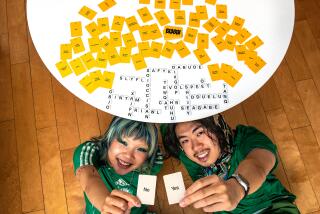Here’s the Word on Hot New Words
- Share via
The editors of Merriam-Webster’s dictionaries always have their ear (collective) to the ground, I assume, to pick up new words that have crept, slid, plunked or been criminally inserted into the language.
In a recent report, they list several such neologisms, indicating in what part of the country each is heard.
The report says one of the current “hot words” in the West is bump , meaning to skip or drop, as in “I bumped the class.” I haven’t heard this alleged addition to our tongue and don’t intend to use it. What’s the matter with drop ?
Another hot word we have all heard is tag , referring to the act of applying graffiti to any convenient surface. Not only is this word common in the West, the act of tagging is the subject of a controversial new course at UCLA, with pro taggers (scofflaws) giving lectures on the art.
Cholo, they tell us, has also come out of the West to enrich the language. It is defined as a synonym for macho , which didn’t seem to need one. The phrase hook up , meaning to engage in romance or sex with someone, is listed as new. “Joe’s hooked up with Sue.” Does that sound new?
Another so-called newcomer, also from the West, is virtual , meaning almost but not quite real. Virtual in that sense is a virtual oldie, I’d say. That UCLA will win in the Rose Bowl is a virtual certainty.
Random is also listed as a new word, meaning “strange, weird, unexpected.” What’s new about that? We might say “the Earth was struck by a random meteor,” meaning strange, weird or unexpected.
The East also keeps injecting new words into the language. According to Merriam-Webster, the hottest one seems to be phat , sometimes spelled fat , meaning cool. Cool was once new slang itself, but is now in the dictionary, defined as excellent or first-rate.
Sauce , meaning beer, is also listed as an Eastern offering. Sauce has long been a slang word for any kind of booze: “He’s on the sauce.” Kicks is listed as a synonym for shoes. Is that new? It seems obvious.
Cheesy is listed as meaning corny or stupid. Cheesy has long been in use as meaning cheap, second-rate, tawdry. The East is also credited with crib , meaning one’s house or abode, although it is described as a word that was popular in the ‘60s and ‘70s and is now back in favor again. Meanwhile, what ever happened to pad ?
The East seems to have lost its vigor. One of its contributions, momouflage , is too clever by half. It is a combination of mom and camouflage and means to hide an article in your knapsack or suitcase that you don’t want your mother to see. I predict that it will go the way of circle of death , a new phrase for a bad pizza.
Meanwhile our old friend, the homophone, keeps popping up in the most unlikely places, turning otherwise good prose into a laugh. A homophone, as you must know, is a word that sounds like another but has a different spelling and meaning--for example plum and plumb , or do , dew and due . The woods are full of them, and otherwise careful writers are always tripping on them.
Only recently I have read in The Times that a workshop was equipped with a vice , that a young woman was studying the marshall arts, and that a husband is made to tow the line. A suburban paper, in a headline, noted that the Rose Queen was about to ascend her thrown.
Meanwhile, I have been questioned about a word I recently used in the following phrase--”the best newspaper lede ever written.” Arthur D. Thatcher Jr. asks, “Does the word lede as it appeared in your column have some arcane connotation?”
Scott Harrison writes: “I have checked all the dictionaries in the house (four) and cannot find lede .” Amazingly, I do not find the word in my dictionaries, either. However, note that my editor did not delete or question it. So she knew what it means.
For at least 100 years, lede has been newspaper parlance for the first sentence or paragraph of a story. I suspect it was spelled that way to distinguish it from lead , pronounced led , meaning a piece of lead used to lengthen columns of Linotype.
Although he professes not to know what lede means, Harrison offers his nominee for the best he ever read:
“World War I reached across a half-century yesterday to claim yet another life.”
“Apparently,” he explains, “a Frenchman was digging in his garden when he hit an unexploded bomb.”
That’s a phat lede.
More to Read
Sign up for Essential California
The most important California stories and recommendations in your inbox every morning.
You may occasionally receive promotional content from the Los Angeles Times.













